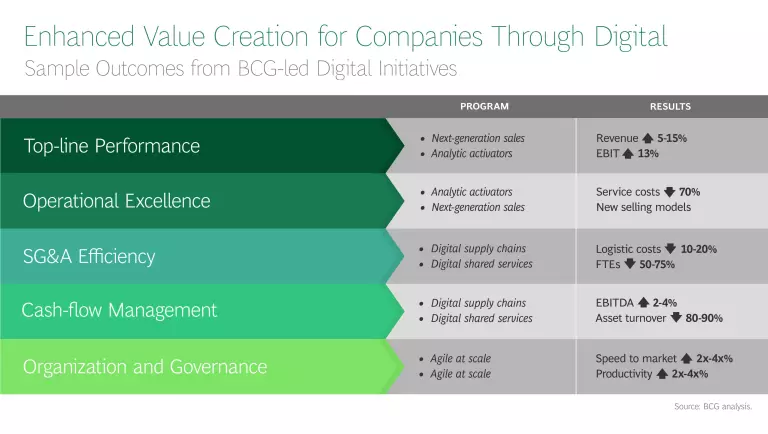BCG’s Digital Acceleration Index tool helps private equity firms evaluate their portfolio companies’ ability to create value through digital—and launch the right digital initiatives to boost companies’ value creation.
Digital tools and technologies are gaining a starring role in the playbooks of nearly every private equity firm. Why? They enable firms to pull traditional value-creation levers with far greater force, realizing much-improved results. Such levers include top-line performance; operational excellence; efficiency in selling, general, and administrative (SG&A) expenses; organization and governance; cash-flow management; and M&A prowess. And that means portfolio businesses can boost revenues through powerful means such as smarter CRM analytics and greater personalization of customers’ experiences.
Because of its unique reach, we view digital as a strategic imperative in private equity. So do the executives at our PE clients, many of whom told us in interviews that the topic of digital is commanding their full attention. But many of these same executives candidly acknowledged feeling unprepared to seize the advantages offered by digital technologies.
To help you fully grasp and realize digital’s promise, we highlight some of BCG’s experiences in deploying digital value-creation levers while working with companies in a diverse array of industries. And we share BCG’s proven approaches—notably our Digital Acceleration Index—for evaluating your portfolio companies’ current and future capability to create value through digital.
DIGITAL APPROACHES AMPLIFY VALUE CREATION
When tapped fully and strategically, digital technologies position portfolio companies in any industry to deliver maximum value to investors by getting more from their traditional value-creation levers—improving top- and bottom-line performance.
Top-Line Performance and Operational Excellence
Thanks to digital, customer touchpoints and delivery channels have proliferated, and customers’ increasingly expect seamless, state-of-the-art experiences. To satisfy them, companies must transform their commercial functions. BCG has used our next-generation sales program to help companies in diverse industries establish digital business units and deliver well-timed, personalized experiences to their customers. These include consistent and seamless purchasing processes across channels and a transformation to customer-centric journeys such as shifting the focus from "granting a home loan" to "helping you move." These initiatives delivered results such as revenue increases of 5-15%, a $2 billion increase in run-rate revenues over three years, and the development of new selling models.
Simultaneously, data is exploding, providing unprecedented visibility into customers, asset performance, companies’ activities, and market trends—and market forces like crowdsourcing have gained momentum. BCG’s analytic activators program has helped companies capture greater value from the data generated by technologies including smart, always-connected sensors and robotics. For instance, BCG teams have used predictive maintenance to improve asset utilization for a consumer appliances company, and data analysis to predict which channels customers will contact for product information and servicing requests. Results from such projects included a three-fold increase in incremental revenue, a 13% improvement in EBIT, and a 70% decrease in service costs.
SG&A Efficiency and Cash-Flow Management
With automation technology advancing further than ever, digital supply chains can become a reality. BCG has worked with client companies, including several steel manufacturers and a large pharma firm, to create such supply chains. Results included 15-30% reductions in inventory; 10-20% decreases in manufacturing, warehousing, and distribution costs; and 2-4% improvements in EBITDA.
Digital shared services have become another important reality, thanks to the use of AI and robotic process automation to perform transactional activities. BCG has used its digital shared services program to help numerous companies boost their SG&A efficiency and streamline their organizational structure. These targeted initiatives included incorporating automation and AI into the companies’ shared service centers for functions such as robotic process automation (RPA) to speed up service center and back-office processes and AI to automate finance through intelligent bill scanning and accounting. Outcomes included 50-75% reductions in full-time employees (FTEs), 80-90% decreases in asset turnover, and 80% reductions in labor costs.
Organization and Governance
In today’s fast-changing world, agility matters more than ever. For some companies, digital approaches can support agility—by rewiring how decisions are made in an enterprise, so companies become more nimble, attract the best talent, use rapid testing and learning to develop new offerings, and get their offerings to market faster.
BCG’s Agile at Scale program has helped executives develop robust solutions for important strategic questions such as How can we respond more quickly to changed market or customer requirements? or How can we break down silos and increase engagement to retain and attract talent? The result is smart, informed decisions made quickly. This program also helps companies break down organizational silos and decrease costly, productivity-sapping bureaucracy. Some of our recent clients garnered results including two- to four-fold improvements in speed to market, similar increases in productivity, and measurable improvements in workforce morale and engagement.
USING THE DIGITAL ACCELERATION INDEX
The message is clear: Given digital’s power to rev up companies’ value-creation engines, PE firms can’t afford to ignore this opportunity. BCG’s Digital Acceleration Index can give them a strong start, by helping them assess the digital maturity of target companies as well as businesses already in their portfolio.
In this way, BCG’s online assessment and benchmarking tool can help PE firms overcome all-too-common barriers to digital mastery. As a result, they can craft digital initiatives that enhance their own operational performance as well as the financial performance of their portfolio companies. Exploring a series of probing questions is a smart first step.
Exploring Important Questions
Results from the Digital Acceleration Index assessment help fund managers explore crucial questions as they screen targets and craft performance-improvement plans for their portfolio companies:
- Which disruptions are reshaping the portfolio company’s industry? What risks do these disruptions pose for the industry, the company, and our overall portfolio? How might digital help mitigate those risks?
- How ready is the portfolio company to capitalize on digital technologies to create more value for investors? For instance, to what degree does digital inform the company’s business strategy? To what extent has it digitalized core functions in its business, such as its product and service innovation, operations, and go-to-market approach? How much of its growth is driven by digital? And how well is it using digital enablers, such as agile approaches, talent with digital skills, and ecosystems of digital providers?
- How does the company stack up against its peers in terms of digital readiness? Which digital topics are lagging behind and are they actually key to succeed in digital in the respective industry?
- What would it take to improve the portfolio company’s digital readiness? To what degree would such moves support the growth strategy of the business?
Selecting the Right Digital Programs for the Job
Once a PE firm has used results from the Digital Acceleration Index to understand where a target or portfolio company needs to deploy digital, it must identify the digital programs that can best help it attain its goals. At BCG, we help clients implement a range of such programs, depending on their needs. Consider these examples:
Manufacturing 4.0
Our Manufacturing 4.0 program uses model factories and simulations to help companies maximize operational efficiency. Manufacturers gain the knowledge and skills needed to use technologies reshaping industry—such as autonomous robots, additive manufacturing, augmented reality, the Industrial Internet, and cloud computing. Results include enhanced productivity, operational flexibility, process speed, and product quality. The program also fosters an “ignite-pilot-scale” approach that helps companies swiftly achieve and build on efficiency and effectiveness gains.
Next-Generation Sales
Our next-generation sales program uses digital technologies to create seamless experiences across channels for all customers. It helps businesses manage sales opportunities, offering and pricing, selling and negotiations, and customer relationships, including equipping sales reps with a digitized cockpit that provides data and knowledge essential for cross-selling.
Analytic Activators
BCG’s analytic activators program uses data analytics to rapidly deliver business value through custom end-to-end solutions that are accretive in 6 months and that have a major P&L impact in 12 months. It draws on advanced pattern recognition and detection to support continuous learning and improvement, and it provides dynamic triggers and alerts for employees’ actions.
Digital Supply Chain
Our digital supply chain program uses predictive analytics to enhance demand forecasting and capacity modeling. It digitally enables sales and operations planning to streamline demand, supply, and inventory matching. It also deploys scenario modeling to optimize manufacturing and distribution footprints and deploys geo-analytics to improve logistics planning and routing.
Digital Shared Services
This program supports real-time data and reporting capabilities. In addition, it draws on robotic process automation and AI to manage manual, transactional activities in shared service centers, freeing employees to focus on more value-creating work. Our digital shared services program also reduces organizational layers to decrease costs and boost productivity in shared service centers and global business services centers.
Agile at Scale
BCG’s Agile at Scale program uses agile ways of working, such as fast pilot projects, to help companies manage digital and traditional projects (including product or service development) as well as improvement programs and organization redesigns. The program supports agile approaches in all functions—IT, support centers, operations, contact centers, marketing and sales—to improve efficiency, productivity, and delivery speed. Equally important, it enables cross-functional teams to collaborate easily and effectively across silos.
Next-Generation Tech Function
This program helps companies develop an advanced tech function that supports digital transformation efforts throughout the business. Examples of the program’s focus areas include creating a sophisticated digital and data platform, strengthening digital capabilities in the IT workforce, implementing agile practices in application development and deployment, and establishing state-of-the-art cybersecurity mechanisms.
NEXT STEPS FOR PE FIRMS
How can PE firms start using digital to pull those value-creation levers with maximum force? We recommend taking a disciplined approach—including mastering several new processes and strengthening specific capabilities.
For example, when it comes to processes, it’s vital that companies:
- Include digital assessment in all target screening,
- Use a standardized template for digital assessment in every due diligence,
- Make digital assessment an integral part of every value-creation plan for portfolio companies,
- Include a standardized digital assessment for every investment committee presentation, and
- Track progress along the way.
As for capabilities, we recommend that firms:
- Start integrating digital skills—such as agile approaches, analytics, and customer-centricity—in their operating model,
- Establish digital expertise in processes such as deal sourcing due diligence, and the development of value-creation plans for portfolio companies,
- Offer ongoing digital training for investment professionals in the firm, and
- Forge partnerships with leading institutions in the digital ecosystem such as analytics platforms or cloud providers.
The Digital Acceleration Index can help PE firms deepen their understanding of the competitive landscape and grapple with crucial strategic questions. Drawing on insights gained from this process, firms can select the most promising target companies and design the right digital-transformation initiatives for their portfolio companies.








